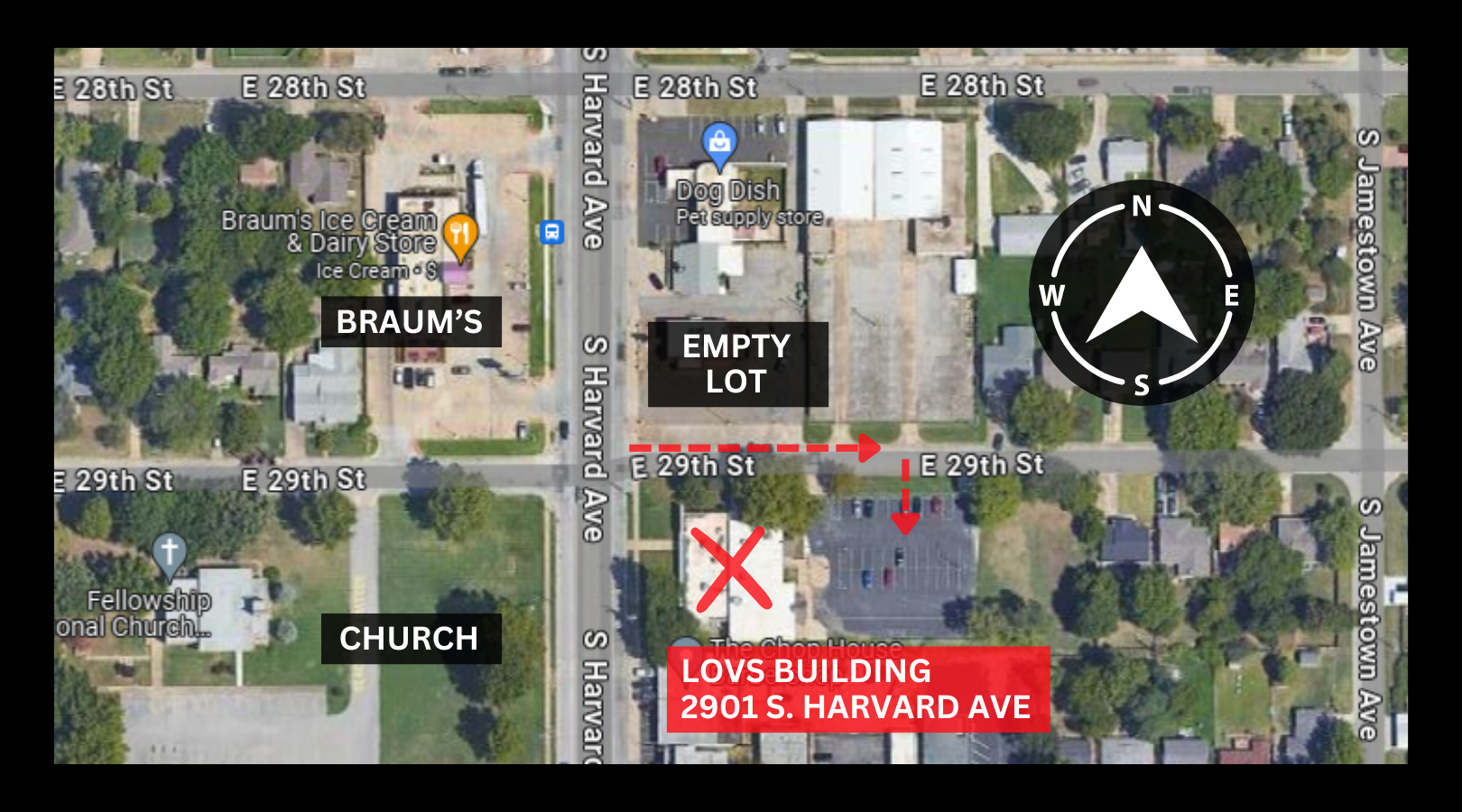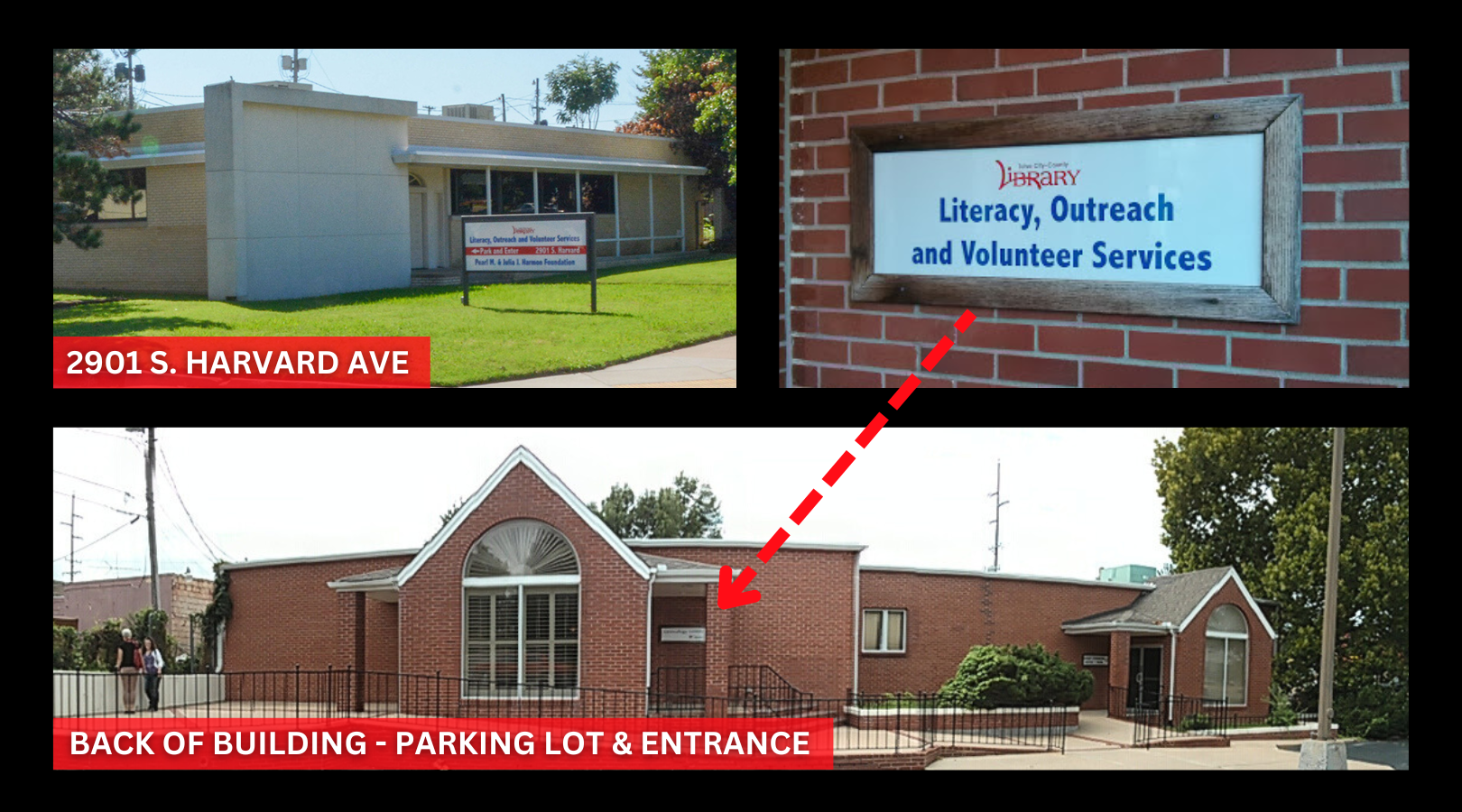Step 1: Contact the Literacy Office
First, contact the Literacy office at 918-549-7400 or literacy@tulsalibrary.org. We will make an appointment for you to come in and take an assessment. In order for you to join the program, we need to ask you some questions and see what kind of help you might need.
Our address is 2901 S. Harvard Ave, Suite A, Tulsa OK 74114 (click for Google Maps). We are in the Literacy, Outreach & Volunteer Services building, on the east side of Harvard across from Fellowship Congregational Church. We are on the south side of 29th Street, across from the empty lot. Turn east onto 29th Street from Harvard and park in the parking lot.


Step 2: Get an Assessment
After you contact the office, we will set up an appointment for you to come in and take an assessment. The assessment is kind of like a test, but there's no way to fail! It just gives us information so we know how to best help you. A literacy staff member or volunteer will give you the assessment. They will explain the process and you can ask them any questions you might have.
Assessments can take an hour or two, so make sure you give yourself plenty of time- we don't want you to feel rushed. We will ask you about your goals and how we might best be able to help you. The assessment also gives us a better idea of what kind of tutor you might want.
Step 3: Have Your Orientation
The next step is to get an orientation. This will be another appointment at the Literacy office. During the orientation, you will learn more about the literacy program and how it works. YOU are in charge of your literacy goals, and we are here to support you however we can. During the orientation, you will learn a lot and you can ask any questions that you have.
Step 4: Wait for a Match
After your orientation, we will start looking for a tutor to match you with!
Step 5: Start Meeting with Your Tutor
When we find a good match for you, we will contact you to set up your FIRST MEETING with your new tutor! Your first meeting will also happen at the Literacy office. Literacy staff will introduce you to your new tutor. They may also give you and your tutor some books or worksheets and some ideas on how to get started. Your tutor will be excited to meet you!
After the first meeting, you and your tutor will decide where and when to meet. Most of our tutors and learners meet once a week, for one hour. Some may meet for a little longer. Most of them meet at a library that is close to where they live. We want you to meet where you are comfortable.
The Rest is Up to You!
We ask everyone to commit to meeting for at least one hour, once a week, for one year. After you've been meeting with your tutor for about a year, we will let you know that it's time for a reassessment appointment. This will help us (and you!) to see where you've made progress. If, after a year, you and your tutor decide to keep meeting, that's great! If you decide to continue and your tutor doesn't, we will match you with another tutor. If you feel that you've gotten all the help you needed, that's fine too. You may want to become a literacy tutor and help someone else! It's up to you.
Why do people join the Literacy program?
People join for all sorts of reasons! Here are some examples:
- You may want to improve your reading skills so you can read more to your children or grandchildren, or help them with their homework
- You may want to improve your reading skills so you can read a book, a news article, or a recipe
- You may want to build your technology skills such as email, texting, or filling out online applications
- English Language Learners (ELLs) may want to work on their conversation skills
- ELLs may want support in studying for tests or exams such as the U.S. Citizenship test, the TOEFL, GED or HiSET, or the written driver's license test.
Can you help me get my GED?
We can help you study for some parts of the GED or HiSET exams, as we do have some study manuals on hand for checkout.
However, it is rare that one of our tutors is prepared to help you study for the math portions of these exams, so you might not be able to get math assistance with our program.
The library has access to several databases that can help you study for the GED on your own:
- Brainfuse: Which has an Adult Learning Center, GED prep and more.
- LearningExpress: High School Equivalency center, test preparation and more.
- Universal Class: Access to hundreds of online classes to learn almost anything.
What are Conversation Circles?
Conversation Circles are a safe and inclusive space where English Language Learners of all levels can come to practice their English. Anyone can join; you do not have to be a member of the literacy program. Conversation Circles are held twice a week, once on Zoom and once in person at Hardesty Regional Library.
- In person: At the Hardesty Regional Library | Every Tuesday at 4:00p.m. - 5:30p.m. | No preregistration required.
- Virtually: On Zoom | Every Wednesday at 12:00p.m. - 1:30 p.m. | Register HERE to get the Zoom link before the class begins.
How can I connect to other resources?
General Assistance Resources:
Tulsa Organizations & Services Database
Use this resource to locate, and connect with, not-for-profit organizations in Tulsa County. TOS features charitable organizations, hobby clubs, educational and advocacy groups, professional societies, civic and fraternal organizations, and cultural institutions.
Free and confidential link to help and hope for those in need, 24/7. Get connected to the right social services near you, including crisis support. Reach 211 in four ways: CALL, LIVE CHAT, TEXT OR SEARCH ONLINE.
Here is a collection of community resources for the needs that we most often see for our learner populations.
What if I have more questions?
You can always contact the Literacy Office if you have questions or concerns:
Phone: 918-549-7400
Email: Literacy@tulsalibrary.org